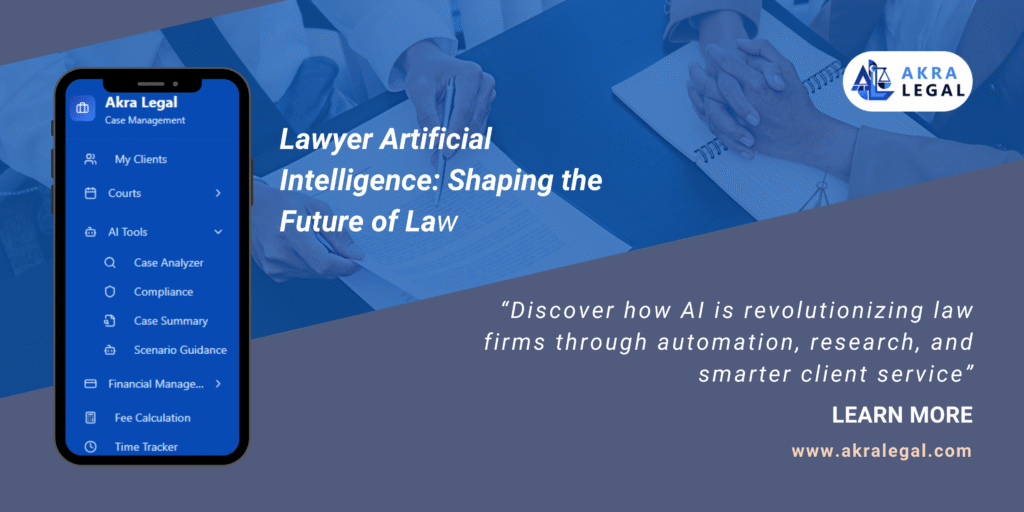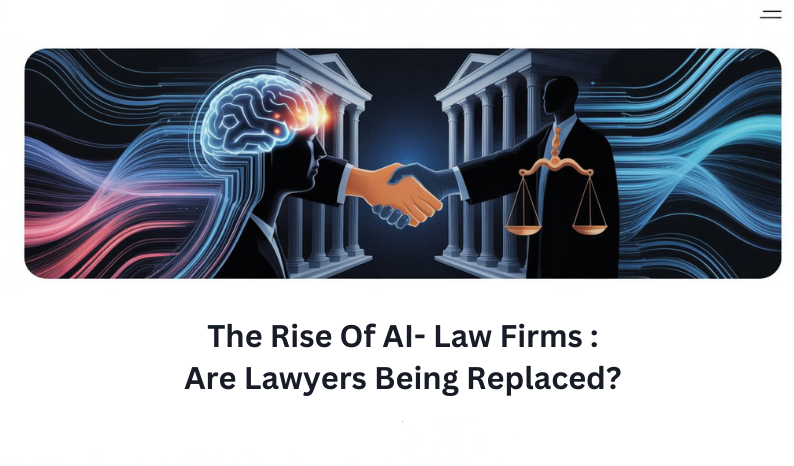
Introduction : Lawyer Artificial Intelligence
The legal industry is experiencing a major transformation evolving from manual paperwork and complex case files to a lawyer artificial intelligence-driven era.
From reviewing thousands of documents in seconds to predicting the outcomes of cases, artificial intelligence in the legal industry is empowering lawyers to work smarter, faster, and more efficiently.
But what exactly is lawyer artificial intelligence, and how is it changing the way attorneys operate? Let’s explore how AI lawyers and legal artificial intelligence are shaping the future of law.
1️. A Historical Look at Artificial Intelligence for Lawyers
The evolution of artificial intelligence for law firms began with simple digital tools and has matured into intelligent systems capable of reasoning and learning.
- Initial Phase: Law firms relied on e-discovery tools and basic document automation.
- AI Expansion: As AI for law firms developed, it began supporting research, contract analysis, and even predicting case trends.
- Today: AI in the legal industry now integrates into every workflow — from billing to compliance.
This evolution shows that technology is no longer a side tool — it’s a core component of modern law practice.
2️. What Is Lawyer Artificial Intelligence?
Lawyer artificial intelligence uses technologies like machine learning and natural language processing to make legal tasks faster and more efficient.
Instead of replacing lawyers, AI for law firms supports them by handling data-heavy, repetitive processes.
Examples of AI lawyer applications include:
- Reviewing and summarizing contracts
- Conducting legal research rapidly
- Managing client communication
- Drafting case-related documents
In short, AI lawyers act as smart assistants freeing lawyers to focus on strategic, human-centered work.
3. How AI Lawyers Are Improving Law Firms
Law firms that have embraced AI lawyers have reported major gains in speed, accuracy, and efficiency.
- Faster Legal Research: AI scans thousands of precedents in seconds.
- More Accurate Work: Advanced lawyer artificial intelligence tools detect errors and inconsistencies with precision.
- Predictive Case Outcomes: Legal artificial intelligence can forecast litigation results based on historical data.
- Workflow Automation: Tasks like billing and document categorization are automated.
- Client Responsiveness: Chatbots and AI systems handle routine queries and document updates instantly.
As a result, AI lawyers have moved from being a novelty to becoming a must-have competitive advantage.
4. Practical Applications of Artificial Intelligence in the Legal Profession
Here’s how artificial intelligence for law firms is transforming multiple legal operations:
- Legal Research: Tools like LexisNexis and Casetext use AI to identify relevant precedents.
- Contract Review: AI detects risky clauses and ensures compliance with the latest regulations.
- E-Discovery: Artificial intelligence analyzes large datasets such as emails, documents, and chat logs for evidence.
- Client Management: Intelligent CRM systems track communication and optimize the client lifecycle.
- Compliance: AI in legal industry ensures that firms stay updated with data privacy and legal standards.
From case intake to closure, lawyer artificial intelligence streamlines every stage of a case.
5. Advantages of Artificial Intelligence for Lawyers
The benefits of using lawyer artificial intelligence include:
- Time Savings: Routine documentation and research are automated.
- Cost Efficiency: Reduced manual labor lowers operational expenses.
- Accuracy: AI lawyers minimize human errors.
- Scalability: Firms can manage more cases with existing resources.
- Client Satisfaction: Faster responses and greater transparency build trust.
By adopting AI in legal industry , law firms deliver better results and improved client experiences.
6. Challenges of Implementing AI in the Legal Sector
Despite its potential, integrating lawyer artificial intelligence has its challenges:
- Data Privacy & Security: Sensitive client data requires secure AI infrastructure.
- Algorithmic Bias: Flawed data can lead to inaccurate AI results.
- Implementation Costs: Advanced AI for law firms requires investment.
- Skill Gaps: Lawyers must be trained to use AI tools effectively.
- Ethical Considerations: Maintaining lawyer-client privilege while using AI remains critical.
These challenges are solvable through responsible use, training, and transparency.
7. Will AI Replace Lawyers?
One of the biggest questions people ask: Will AI replace lawyers?
The answer is clear – no.
While AI lawyers can automate repetitive tasks, they cannot replace human qualities like empathy, moral judgment, or creativity.
The legal profession depends on reasoning, ethics, and advocacy – areas where humans will always lead.
Instead, artificial intelligence for lawyers complements legal work by handling the routine, allowing attorneys to focus on strategy and relationship-building.
8. The Future of Legal Artificial Intelligence
Over the next decade, legal artificial intelligence will become even more integral to law firms. Key trends include:
- Predictive Law: AI predicting case outcomes using data and judicial patterns.
- AI Administrative Assistants: AI managing schedules, research, and client updates.
- Smart Document Automation: AI drafting and reviewing legal documents independently.
- Voice-Based AI Support: Lawyers dictating notes or research commands hands-free.
- Ethical AI Regulation: Governments ensuring transparency and fairness in AI applications.
Forward-thinking firms adopting AI in legal industry today will lead tomorrow’s legal landscape.
9. Best Practices for Implementing AI in Your Law Firm
If your law firm is considering artificial intelligence for law firms, start with these steps:
- Start Small: Begin with a focused use case such as document automation.
- Choose Trusted Tools: Prioritize secure, data-compliant AI lawyer solutions.
- Train Your Team: Conduct workshops to improve digital fluency.
- Evaluate Outcomes: Measure saved time, accuracy improvements, and ROI.
- Be Transparent: Inform clients how lawyer artificial intelligence supports their case.
These steps ensure smooth, ethical, and scalable AI adoption.
Collaboration Between Lawyers and AI
The future of law isn’t humans versus machines – it’s humans with machines.
When lawyers combine their strategic and emotional intelligence with artificial intelligence for law firms, they deliver more accurate, accessible, and efficient services.
- Lawyers: Handle strategy, negotiation, and client relations.
- AI: Manages data processing, automation, and analytics.
Together, they create a legal system that is smarter, faster, and more client-centered.
Akralegal: Leveraging Lawyer Artificial Intelligence
At Akralegal, we recognize that the next generation of law practice depends on innovation.
Our AI-powered platform enables modern law firms to manage clients, documents, and cases within one intelligent ecosystem.
From AI lawyers for research and document automation to legal artificial intelligence for analytics and client success – Akralegal helps your firm stay ahead in the digital legal landscape.
👉 Experience the power of lawyer artificial intelligence with Akralegal – where technology meets expertise.
Conclusion
Lawyer artificial intelligence is reshaping the legal world — empowering firms to work faster, make data-driven decisions, and serve clients more efficiently, all while maintaining the human connection that defines the profession.
Law firms that adopt AI in the legal industry today are building smarter, more adaptable practices for the future.
With Akralegal, lawyers can innovate, achieve better outcomes, and stay competitive in a rapidly evolving digital era.




